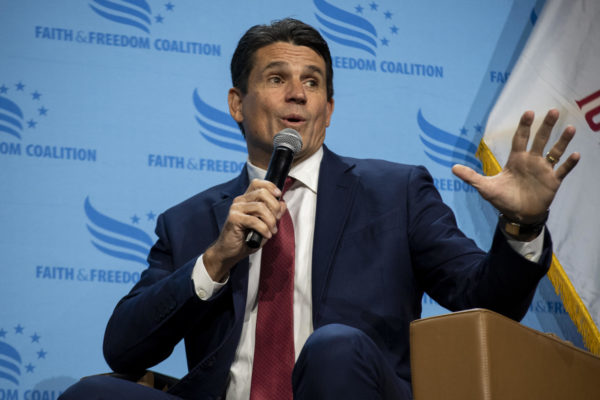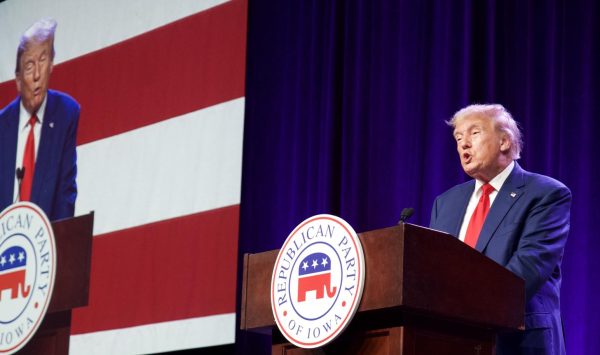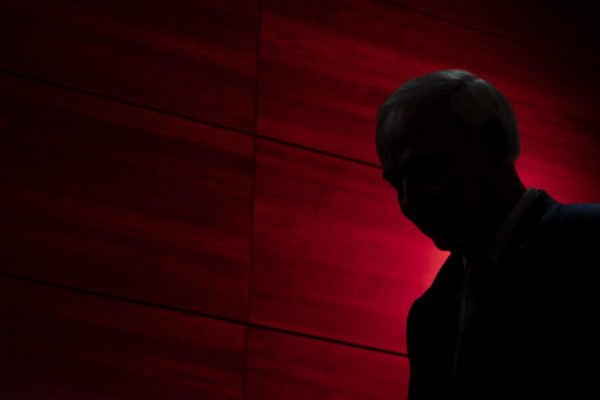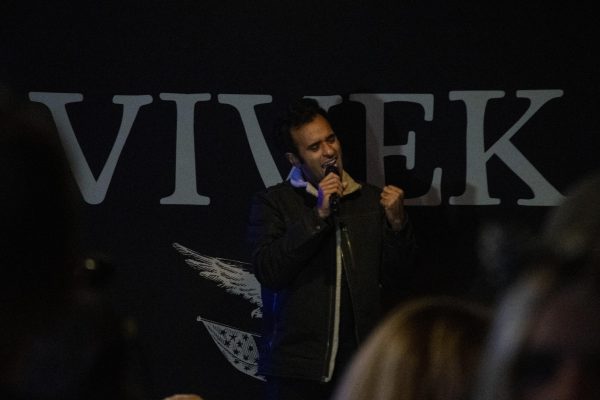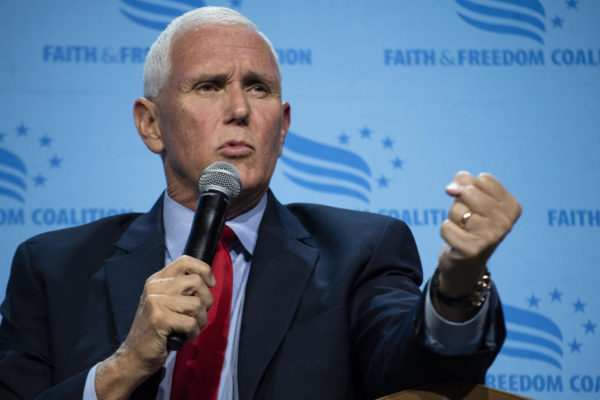Bush, McCain, Obama meet for tentative meltdown deal
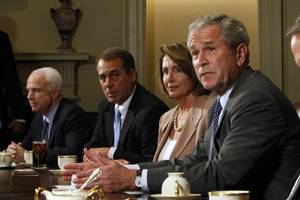
President Bush, second from right, meets with congressional leaders during a meeting in the Cabinet Room of the White House, Thursday, Sept. 25, 2008, in Washington to discuss the proposed bailout of the financial industry. Seated from left are Republican presidential candidate Sen. John McCain, R-Ariz., Minority Leader Sen. John A. Boehner, R-Ohio, and Speaker of the House Rep. Nancy Pelosi, D-Calif. (AP Photo/Pablo Martinez Monsivais)
September 25, 2008
WASHINGTON (AP) — President Bush and the two men fighting to succeed him joined forces at a historic White House meeting Thursday, trying to sell a multibillion-dollar bailout plan for Wall Street aimed at staving off what the president called “a serious economic crisis.” Key lawmakers struck a deal earlier in the day, but many members of Congress were resisting.
Democrat Barack Obama and Republican John McCain, who have both sought to distance themselves from the unpopular Bush, sat down with the president at the White House for an hourlong afternoon session that was striking in this brutally partisan season and apparently without precedent. By also including Congress’ Democratic and Republican leaders, the meeting gathered nearly all Washington’s political power structure at one long table in a small West Wing room.
“All of us around the table … know we’ve got to get something done as quickly as possible,” Bush told reporters, brought in for only the start of the meeting. Obama and McCain were at distant ends of the oval table, not even in each other’s sight lines. Bush, playing host in the middle, was flanked by Congress’ two Democratic leaders, House Speaker Nancy Pelosi and Senate Majority Leader Harry Reid.
No one else spoke before the cameras left.
Hours earlier, private talks on Capitol Hill ended with the announcement that an agreement in principle had been reached on a financial rescue package — though changed somewhat from the one the Bush administration proposed last weekend.
The tentative accord would give the Bush administration just a fraction of the $700 billion it had requested up front, with half the money subject to a congressional veto, congressional aides said. Under the plan, the Treasury secretary would get $250 billion immediately and could have an additional $100 billion if he certified it was needed. The last $350 billion could be blocked by a vote of Congress under the arrangement, designed to give lawmakers a stronger hand in controlling the unprecedented rescue.
The aides described the details on condition of anonymity because they were not authorized to speak publicly.
There were signs that the conservative-leaning House Republican Caucus was not on board. Both of Congress’ Republican leaders, Rep. John Boehner and Sen. Mitch McConnell, issued statements saying there was not yet an agreement.
But Banking Chairman Chris Dodd, D-Conn., and Republican Sen. Bob Bennett, among others, said negotiators from Congress and the administration had arrived at a deal that could win approval. Other key lawmakers said that after days of bare-knuckles negotiations there was little of note left to resolve.
Wall Street showed its pleasure cautiously. The Dow Jones industrials closed some 196 points higher, though that was down from larger gains earlier in the day.
The plan’s centerpiece is for the government to buy the toxic, mortgage-based assets of shaky financial institutions in a bid to keep them from going under and setting off a cascade of ruinous events, including wiped-out retirement savings, rising home foreclosures, closed businesses, and lost jobs.
The Bush administration has made concessions almost daily to demands from the right and the left from its original three-page proposal, including agreeing to limit pay for executives of bailed-out financial institutions and give taxpayers an equity stake in rescued companies.
The White House timed the extraordinary meeting to fit the candidates’ schedules — and to convene after the close of stock markets.
It was somewhat upstaged nearly three hours before various motorcades deposited the meeting participants and their entourages, when Capitol Hill leaders reported their deal. Despite the national prominence of Bush, McCain and Obama, none has been deeply involved in this week’s scramble to hammer out a package.
The developments on the Hill lent fresh and urgent purpose to the session: providing encouragement — and political cover — for lawmakers of both parties to accept a plan. It is expected to come up for votes in the House and Senate quickly, perhaps within days, so that lawmakers can adjourn to campaign for their own re-elections.
But any pitch by Bush, Obama and McCain would be no easy sell.
All lawmakers are returning to home districts packed with constituents angry that they are being asked to foot the bill to bail out Wall Street’s rich guys when they and their neighbors are suffering the effects of ballooning mortgages and tightening credit. This means Obama and even the increasingly marginalized Bush could have sway with their joint resolve.
McCain, in particular, was being leaned on by Democrats and fellow Republicans alike to deliver GOP votes, as some conservatives are in open revolt over the astonishing price tag of the proposal and the heavy hand of government that it would place on private markets. Placating them enough to bring them in line could be a tall order for the Republican presidential nominee who has a checkered relationship with the right wing of his party.
A group of GOP lawmakers circulated a less government-focused alternative. Their proposal would have the government provide insurance to companies that agree to hold frozen assets, rather than have the government purchase the assets. Rep Eric Cantor, R-Va., said the idea would be to remove the burden of the bailout from taxpayers and place it, over time, on Wall Street instead.
Layered over the White House meeting was a complicated web of potential political benefits and consequences for both Obama and McCain.
McCain hoped voters would believe that he rose above politics to wade into successful, nitty-gritty dealmaking at a time of urgent crisis, but he risked being seen instead as either overly impulsive or politically craven, or both. Obama saw a chance to appear presidential and fit for duty, but was also caught off guard strategically by McCain’s surprising gamble in saying he was suspending his campaigning and asking to delay Friday night’s debate to focus on the crisis.








